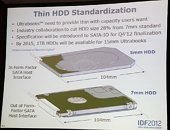Thursday, April 12th 2012

7 mm Won't Cut It, Intel Wants 5 mm-Thick Drives for Ultrabooks
Custodian of the Ultrabook specification, Intel pushed the storage industry to churn out slimmer devices to go with increasingly slimmer Ultrabooks sold by the various partner ODMs in the ecosystem. Even as HDD and SSD makers have only just come up with 7 mm-thick storage devices, Intel has a fresh list of changes it wishes to see with storage devices in the very near future, to be able to make it to the constantly-evolving Ultrabook specification. Intel wants near-future storage devices (SSDs and HDDs) to be no thicker than 5 mm.
Further, it wants to see the standard SATA host interface changed from "around" (out of) form, to "along" (inside) form host interface, which further slims down the drive compartment. These proposals were floated at IDF, Beijing. While coming up with slimmer SSDs was never really a tough task for SSD makers, as SSDs are essentially just millimeter-thick printed circuit boards with millimeter-thick components (controller logic, NAND flash memory, and ancillaries), it posed a huge technical challange to mechanical HDD designers, who have had to slim down key components that work to maintain inertial motion of spinning platters. This new proposal for 5 mm-thick HDDs could pose a newer, tougher desgin challenge.
Source:
VR-Zone
Further, it wants to see the standard SATA host interface changed from "around" (out of) form, to "along" (inside) form host interface, which further slims down the drive compartment. These proposals were floated at IDF, Beijing. While coming up with slimmer SSDs was never really a tough task for SSD makers, as SSDs are essentially just millimeter-thick printed circuit boards with millimeter-thick components (controller logic, NAND flash memory, and ancillaries), it posed a huge technical challange to mechanical HDD designers, who have had to slim down key components that work to maintain inertial motion of spinning platters. This new proposal for 5 mm-thick HDDs could pose a newer, tougher desgin challenge.

43 Comments on 7 mm Won't Cut It, Intel Wants 5 mm-Thick Drives for Ultrabooks
I want them to be also transparent! :mad:
LOLOLOL
storage.toshiba.eu/export/sites/toshiba-sdd/media/products/datasheets/mk4009gal_datasheet.pdf
discountechnology.com/Samsung-SSD-IDE-Hard-Drive-MCCOE64GEMPP-01A
And with current platter densities, I'd guess 160GB would be easy in a 1" Microdrive today.
I generally like companies encouraging industry wide progress. But this "new incompatible" standard just aint it. :mad: